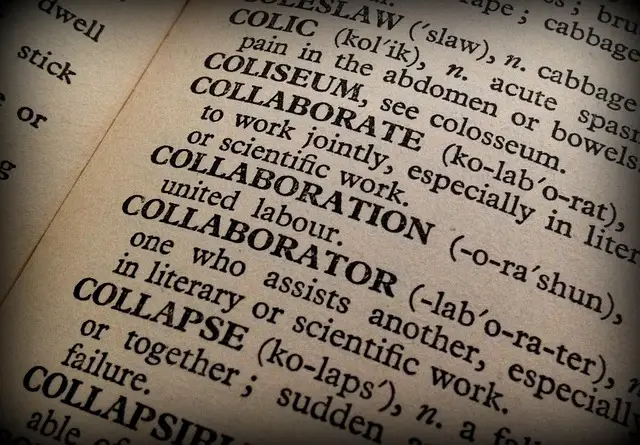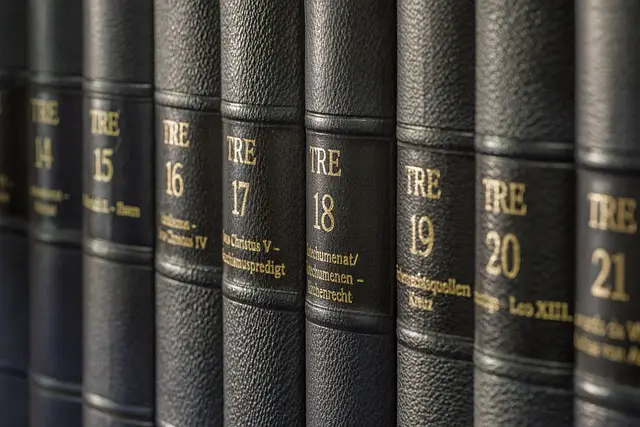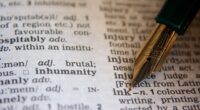A dictionary defines words and their meanings, while an encyclopedia provides detailed information on a wide range of topics, including concepts, events, and people.
TL;DR Dictionary Vs. Encyclopedia
A dictionary is a reference book that provides definitions, spellings, pronunciation guides, and sometimes examples of how words are used in sentences. It acts as a language guide and helps users understand the meanings and usages of words. Dictionaries can be monolingual (providing definitions in one language), bilingual (providing translations between two languages), or even include synonyms and antonyms like a thesaurus.
An encyclopedia is a comprehensive collection of articles on various subjects. It covers a wide range of topics and provides detailed information about each subject. Encyclopedias are usually organized alphabetically or by categories to facilitate easy navigation for readers. They aim to provide an overview of knowledge on specific topics or fields.
What is a Dictionary?

A dictionary is a comprehensive reference tool that provides definitions, meanings, pronunciations, and sometimes etymologies of words in a specified language. It serves as a linguistic guide, offering information about the correct usage, spelling, and syntactical features of words.
Dictionaries may include additional details such as word origins, part-of-speech classifications, and sample sentences. They are crucial resources for language learners, writers, editors, and anyone seeking precise and accurate language comprehension.
In the digital age, dictionaries are often available online or as software applications, offering convenient access to a vast repository of lexical information. Specialized dictionaries cater to various fields, including medical, legal, and scientific terminology.
What is an Encyclopedia?

An encyclopedia is a comprehensive reference work that systematically compiles and organizes information on a wide range of topics. It encompasses articles or entries providing detailed insights into concepts, events, people, and places.
Encyclopedias aim to offer a holistic understanding of human knowledge and the world, covering fields such as science, history, literature, and more. Entries are typically arranged alphabetically or thematically, providing readers with in-depth knowledge, context, and cross-referencing.
Encyclopedias serve as educational tools, supporting research, exploration, and general knowledge acquisition. With the advent of digital technology, many encyclopedias have transitioned to online platforms, allowing for dynamic updates and multimedia integration, thus providing users with a versatile and evolving information resource.
Dictionary Vs. Encyclopedia – Key differences
| Aspect | Dictionary | Encyclopedia |
|---|---|---|
| Purpose | Defines words and provides linguistic information. | Offers comprehensive information on a wide range of topics, including concepts, events, people, and places. |
| Content | Focuses on individual words, providing meanings, pronunciations, and usage. | Covers a diverse array of subjects, offering detailed articles or entries with context and background information. |
| Arrangement | Usually alphabetically organized for easy word lookup. | Entries may be arranged alphabetically or thematically, creating a structured knowledge base. |
| Scope | Language-focused, providing linguistic details. | Expansive, encompassing various fields of knowledge, sciences, humanities, and more. |
| Usage | Primarily used for understanding and using language. | Utilized for research, learning, and gaining comprehensive knowledge on specific subjects. |
| Examples | Merriam-Webster's Dictionary, Oxford English Dictionary. | Encyclopædia Britannica, World Book Encyclopedia. |
Types of Dictionaries
Monolingual Dictionary:
Defines and explains words in a single language. Examples include Merriam-Webster’s English Dictionary or Oxford English Dictionary.
Bilingual Dictionary:
Provides translations of words between two languages. Examples include the Oxford Spanish-English Dictionary or Collins French-English Dictionary.
Thesaurus:
Lists words with similar or related meanings, aiding in finding synonyms. Examples include Roget’s Thesaurus or Merriam-Webster’s Collegiate Thesaurus.
Specialized Dictionary:
Focuses on terminology within a specific field, such as medical, legal, scientific, or technical dictionaries.
Visual Dictionary:
Presents word meanings through illustrations or images, aiding visual learners in understanding concepts.
Rhyming Dictionary:
Lists words with similar end sounds, helpful for poets and lyricists.
Idiom Dictionary:
Explains the meanings and origins of idiomatic expressions and phrases used in a language.
Encyclopedic Dictionary:
Combines features of both a dictionary and encyclopedia, providing detailed information on words and broader topics.
Unabridged Dictionary:
Contains a comprehensive and unabridged collection of words, providing extensive coverage.
Types of Encyclopedias (General, Subject-Specific)
General Encyclopedia:
Provides a broad overview of knowledge across various subjects. Examples include Encyclopædia Britannica and World Book Encyclopedia.
Subject-Specific Encyclopedia:
Focuses on a particular field or subject, such as science, history, arts, or technology. Examples include the Encyclopedia of Psychology or the Oxford Companion to Music.
Regional Encyclopedia:
Concentrates on the history, culture, and geography of a specific region or country.
Biographical Encyclopedia:
Offers detailed entries on individuals’ lives, achievements, and contributions.
Medical Encyclopedia:
Covers medical and healthcare-related topics, providing information on diseases, treatments, and medical history.
Legal Encyclopedia:
Focuses on legal principles, cases, and concepts within a jurisdiction.
Encyclopedic Dictionary:
Combines dictionary and encyclopedia features, offering concise information on words and broader topics.
Online Encyclopedia:
Exists in digital format, often allowing for dynamic updates, multimedia content, and user interactions.
Children’s Encyclopedia:
Tailored for young readers, presenting information in a format suitable for children’s understanding.
Specialized Encyclopedia:
Targets a specific niche or industry, such as technology, business, or philosophy.
Image Credits
Featured Image By – Michal Jarmoluk from Pixabay
Image 1 By – Dianne Hope from Pixabay
Image 2 By – Julia Schwab from Pixabay








